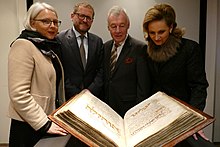Emile Schrijver
Emile George Lodewijk Schrijver (born September 10, 1962 in Amsterdam ) is a Dutch Hebraist . Since 2015 he has been General Director of Joods Cultureel Kwartier (JCK) in Amsterdam.
Professional background
Emile Schrijver is of Jewish descent through his father. The father survived the Holocaust because he stayed in the Dutch East Indies during the war years and was interned there with his wife . Only after their return to the Netherlands did the couple learn of the death of numerous relatives of their father.
By reading the works of Jacques Presser , Emile Schrijver developed his interest in Jewish culture as a teenager . According to his own statement from 2020, he is “one of the ten most visible Jews in Amsterdam”.
Schrijver studied Hebrew at the University of Amsterdam from 1980 to 1985 . He then did research for the Nederlandse Organizatie voor Wetenschappelijk Onderzoek (NWO). Between 1996 and 2004 he was director of the Mennasseh ben Israel Instituut for cultural and social Jewish studies in Amsterdam, from 2003 curator of the Bibliotheca Rosenthaliana , the Jewish library of the Amsterdam University. He is also the curator of the Braginsky Collection of Hebrew manuscripts and books in Zurich . He is the main editor of the Encyclopedia of Jewish Book Cultures , which will be published by Brill from 2020 , and chairman of the European Association of Jewish Museums , which he co-founded in 1989. From 2012 to 2013 he was interim director of the Ets Haim library . Since 2013 he has been teaching Jewish book history as an associate professor at Amsterdam University .
In 2015 Emile Schrijver was appointed General Director of the Joods Cultureel Kwartier in Amsterdam, succeeding Joel Cahen , who was retiring. The cultural quarter includes the Hollandsche Schouwburg , the Portuguese Synagogue , the National Holocaust Museum and the Joods Historisch Museum . The opening of the Holocaust Museum will make it possible to give more space to the presentation of Jewish culture in the Joods Historisch Museum : "[...] we willen vierhonderd jaar Joods Nederland niet reduceren tot vijf jaar catastrofe". ("We don't want to reduce 400 years of the Jewish Netherlands to five years of catastrophe.")
Under Schrijver's aegis, the Joods Historisch Museum and MiQua from Cologne acquired the precious Hebrew manuscript Amsterdam Machsor , which will henceforth be shown alternately in the two cities.
Honors
In 2018 Emile Schrijver was awarded the Austrian Cross of Honor for Science and Art .
Web links
- Literature by and about Emile Schrijver in the bibliographic database WorldCat
- Literature by and about Emile Schrijver in the catalog of the German National Library
- List of publications by Emile Schrijver on academia.edu . Retrieved March 20, 2020.
- Ferry Biederman: De balanceeract van Emile Schrijver.Hoeder van Joods erfgoed on joodswelzijn.nl. Retrieved March 20, 2020.
Individual evidence
- ↑ Uitkrant , September 2019, p. 34.
- ↑ a b Ferry Biederman: De balanceeract van Emile Schrijver, Hoeder van Joods erfgoed on joodswelzijn.nl. Retrieved March 20, 2020.
- ↑ Emile Schrijver. In: jonet.nl. Retrieved March 20, 2020 (Dutch).
- ↑ Miriam Goldmann: "Hebrew, Yiddish, Aramaic and sometimes Latin". In: jmberlin.de. September 3, 2015, accessed March 20, 2020 .
- ↑ Ronit Palache interviews Prof. dr. Emile Schrijver. In: aac.uva.nl. Retrieved March 20, 2020 (Dutch).
- ↑ Prof. Dr. Emile Schrijver. In: asser.nl. Retrieved March 20, 2020 .
- ^ Susanne Lenz: Jewish Museum Berlin: Under observation. In: fr.de. September 2, 2019, accessed March 20, 2020 .
- ^ Emile Schrijver, professor by special appointment of Jewish Book History. Universiteit van Amsterdam, July 15, 2013, accessed on March 20, 2020 .
- ^ Nieuwe directeur voor Joods Historisch Museum. In: parool.nl. June 30, 2015, accessed March 20, 2020 (Dutch).
- ^ Emile Schrijver is the director of the Joods Historisch Museum. In: bijzonderecollecties.uva.nl. Retrieved March 20, 2020 (Dutch).
- ↑ An icon of Jewish history. In: lvr.de. December 13, 2017, accessed March 20, 2020 .
- ↑ Director Emile Schrijver ontvangt Oostenrijks Erekruis. In: jck.nl. Retrieved March 20, 2020 .
| personal data | |
|---|---|
| SURNAME | Schrijver, Emile |
| ALTERNATIVE NAMES | Schrijver, Emile George Lodewijk (full name); Schrijver, Emile GL |
| BRIEF DESCRIPTION | Dutch Hebraist |
| DATE OF BIRTH | September 10, 1962 |
| PLACE OF BIRTH | Amsterdam |
